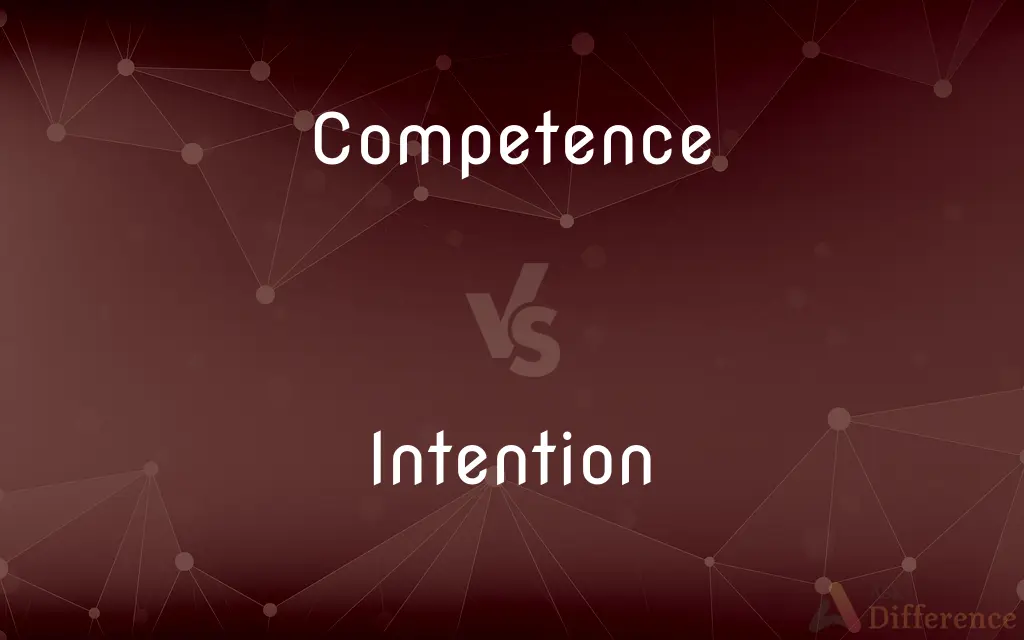Competence vs. Intention — What's the Difference?
By Tayyaba Rehman — Updated on July 27, 2023
Competence refers to one's ability to perform a task effectively, while intention pertains to one's plan or desire to carry out an action.

Difference Between Competence and Intention
Table of Contents
ADVERTISEMENT
Key Differences
Competence refers to an individual's capacity or ability to perform tasks or roles effectively, while intention pertains to a person's deliberate plan or aim to act in a particular way.
Competence implies mastery of specific skills or knowledge, while intention represents the motivation to use that competence.
Competence relates to a learner's ability to understand and apply knowledge, while intention signifies their goal or purpose for learning.
Competence pertains to the practical ability to carry out an ethical action, intention refers to the moral will to do so.
Competence signifies the capacity to understand and participate in legal proceedings, whereas intention pertains to a person's state of mind when committing an act.
ADVERTISEMENT
Comparison Chart
Definition
The ability or knowledge that enables a person to do something well.
A mental state that represents a commitment to carry out an action.
Focus
On the ability, skill, or knowledge possessed.
On the plan or aim to execute a certain action.
Usage
Usually used to evaluate or gauge the ability of an individual or entity in a specific area or task.
Often used to predict or understand behavior based on planned actions.
Example
"The engineer demonstrated her competence in solving complex problems."
"He expressed his intention to retire at the end of the year."
Measurement
Can be assessed through performance tests, skill evaluations, or successful completion of tasks.
Can be inferred from verbal statements, plans, or goals, but it's difficult to measure directly as it involves personal thoughts and plans.
Temporal Aspect
Usually demonstrated in the present, based on past learning or experiences.
Concerns future actions or behaviors.
Compare with Definitions
Competence
The ability to perform a specific task, action, or function successfully.
His competence in coding was displayed by his ability to debug complex programs quickly.
Intention
A planned or desired outcome.
My intention is to finish the project by next week.
Competence
The ability to do something well or efficiently.
Intention
The purpose or goal behind an action.
His intention behind writing the book was to share his unique experiences.
Competence
The state of being qualified to perform certain actions or tasks.
The company trusted his competence in managing a team; hence they promoted him to a supervisor role.
Intention
Intention is a mental state that represents a commitment to carrying out an action or actions in the future. Intention involves mental activities such as planning and forethought.
Competence
A range of skills or abilities.
His competence extends from playing piano to composing symphonies.
Intention
The design or plan behind a particular action.
The intention behind the policy change was to improve working conditions.
Competence
Legal authority or ability to deal with a matter or case.
The court demonstrated its competence by swiftly resolving the complicated dispute.
Intention
The intent to act in a specific way to achieve a specific outcome.
Despite his good intentions, the outcome was not as expected.
Competence
(countable) The quality or state of being able or suitable for a particular task; the quality or state of being competent for a particular task or skill.
Intention
A mental state that represents a commitment to carry out an action in the future.
She announced her intention to run for office next year.
Competence
(uncountable) The quality or state of being competent, i.e. able or suitable for a general role.
Intention
A determination to act in a certain way or to do a certain thing; purpose; design; as, an intention to go to New York.
Competence
The condition or quality of being adequately or well qualified physically and intellectually.
His competence as a surgeon was acknowledged when he performed a complex operation with ease.
Intention
The object toward which the thoughts are directed; end; aim.
In [chronical distempers], the principal intention is to restore the tone of the solid parts.
Competence
A range of skill or ability.
It was a task beyond his competence.
Intention
Conceptions formed by directing the mind towards an object.
Competence
A specific ability or skill.
She has a surprising competence in dealing with animals.
Intention
It refers to the aim or objective one hopes to achieve.
He went to the meeting with the intention of presenting his new idea.
Competence
The capacity to deal effectively with a task or job.
Her competence in crisis management saved the company from a major scandal.
Intention
The anticipated outcome that guides your planned actions.
His intention was not to harm, but to protect.
Competence
A specific ability or skill-set which enables the accomplishment of a job.
Her competence in public speaking made her the perfect candidate for the role of sales director.
Intention
The direction or orientation of the mind towards an object.
With a clear intention, she focused on her studies.
Competence
Mastery of a specific set of skills, indicating proficiency or capability.
His artistic competence was recognized when he won the national painting competition.
Intention
A thing intended; an aim or plan.
He announced his intention to stand for re-election.
She was full of good intentions.
Competence
(Law) The quality or condition of being legally qualified or fit to perform an act.
Intention
The healing process of a wound.
Competence
(Microbiology) The ability of bacteria to be genetically transformable.
Intention
The action or fact of intending.
Are computers capable of intention?
Competence
(Medicine) The ability to respond immunologically to bacteria, viruses, or other antigenic agents.
Intention
An aim that guides action; an objective.
My intention is to learn Russian.
Competence
(Linguistics) The knowledge that enables one to speak and understand a language.
Intention
(Medicine) The process by which or the manner in which a wound heals.
Competence
Sufficient means for a comfortable existence.
Intention
(Archaic) Import; meaning.
Competence
(linguistics) The system of linguistic knowledge possessed by native speakers of a language, as opposed to its actual use in concrete situations (performance), cf. linguistic competence.
Intention
A course of action that a person intends to follow.
My intention was to marry a wealthy widow.
It’s easy to promise anything when you have no intention of fulfilling any of it.
Competence
(dated) A sustainable income.
Intention
The goal or purpose.
The intention of this legislation is to boost the economy.
Competence
The legal authority to deal with a matter.
Intention
(obsolete) Tension; straining, stretching.
Competence
(geology) The degree to which a rock is resistant to deformation or flow.
Intention
A stretching or bending of the mind toward an object or a purpose (an intent); closeness of application; fixedness of attention; earnestness.
Competence
The state of being competent; fitness; ability; adequacy; power.
The loan demonstrates, in regard to instrumental resources, the competency of this kingdom to the assertion of the common cause.
To make them act zealously is not in the competence of law.
Intention
(obsolete) The object toward which the thoughts are directed; end; aim.
Competence
Property or means sufficient for the necessaries and conveniences of life; sufficiency without excess.
Reason's whole pleasure, all the joys of sense,Lie in three words - health, peace, and competence.
Superfluity comes sooner by white hairs, but competency lives longer.
Intention
(obsolete) Any mental apprehension of an object.
Competence
Legal capacity or qualifications; fitness; as, the competency of a witness or of a evidence.
Intention
(medicine) The process of the healing of a wound.
Competence
The quality of being adequately or well qualified physically and intellectually, especially possession of the skill and knowledge required (for a task).
Intention
To intend.
Competence
The quality of being adequately or well qualified physically and intellectually.
Intention
A stretching or bending of the mind toward an object; closeness of application; fixedness of attention; earnestness.
Intention is when the mind, with great earnestness, and of choice, fixes its view on any idea.
Competence
Demonstrated proficiency or expertise in a particular area.
Her competence in French was evident from her fluent conversation with the Parisians.
Intention
The state of being strained.
Intention
Any mental apprehension of an object.
Intention
An anticipated outcome that is intended or that guides your planned actions.
His intent was to provide a new translation.
Good intentions are not enough.
Intention
(usually plural) The goal with respect to a marriage proposal.
His intentions are entirely honorable.
Intention
An act of intending; a volition that you intend to carry out.
My intention changed once I saw her.
Intention
A resolve or determination to act in a certain way.
With the intention to live healthier, he began exercising and eating right.
Common Curiosities
What is the difference between competence and intention?
Competence refers to the ability or capacity to do something effectively or efficiently. Intention, on the other hand, pertains to one's planned or desired outcome; it's about what one plans or aims to do regardless of their ability to achieve it.
What is the difference between intention and competence of myself?
Intention refers to your personal plans or goals, what you aim or plan to do. Competence, on the other hand, refers to your ability or skill to carry out those plans or achieve those goals.
What is the second form of intention?
The second form of the word 'intention' is 'intended.' This is the past tense and past participle of the verb 'intend.'
What is the base word of intention?
The base word of 'intention' is the verb 'intend.'
What is intention 3 synonyms?
Three synonyms for intention are aim, plan, and purpose.
What is intention in English Oxford?
According to the Oxford English Dictionary, intention is defined as a thing intended, an aim, or a plan.
What is the difference between intention and intent?
In everyday language, intention and intent are often used interchangeably. In some legal contexts, however, intent can imply a stronger, more determined plan than intention.
What is a good example of competence?
A good example of competence is a surgeon demonstrating precise surgical skills, extensive medical knowledge, and the right attitude toward patient care.
What is the difference between intention and desire?
Intention refers to a concrete plan or decision to do something, while desire refers to a strong feeling of wanting something or wishing for something to happen, which may not necessarily lead to action.
What is a simple word for intention?
A simple word for intention could be "plan."
What is intention in moral theory?
In moral theory, intention refers to the purpose or goal behind an action. It plays a crucial role in evaluating the morality of an action, as many theories suggest that an action is morally right or wrong depending on the intention behind it.
What is the difference between common intention and knowledge?
Common intention refers to a shared understanding or agreement between two or more people about future action, while knowledge is the accumulation of facts, information, and skills acquired through experience or education.
What is an example of intention and knowledge?
An example of intention and knowledge could be a student who intends (plans) to get a high grade in a test and uses their knowledge (understanding of the subject) to achieve this goal.
What is competency vs competence?
Competency refers to the required standard of knowledge, skills, and behavior needed to perform a particular role or task, while competence refers to the actual demonstrated ability of an individual to perform that task.
What is intention in logic?
In logic, intention refers to the internal content of a concept, the inherent sense or connotation that a term carries within itself.
What are good intentions called?
Good intentions are often referred to as benevolence, goodwill, or altruism, suggesting actions planned to benefit others or do good.
What is the meaning of competent person?
A competent person refers to an individual who has the necessary skills, knowledge, experience, and capability to perform a specific task or job effectively and safely.
What is the meaning of trust on intention?
Trust on intention refers to the belief in someone's stated plans or goals, with the assumption that they are sincere and will act accordingly to accomplish them.
What is competence in education?
In education, competence refers to a learner's ability to apply knowledge, skills, and attitudes in order to meet certain standards or benchmarks in a particular subject or discipline.
What is an example of intention in psychology?
In psychology, an example of intention could be a person setting a goal to reduce anxiety by practicing mindfulness meditation daily.
What is competence in human values?
Competence in human values refers to one's ability to understand, appreciate, and live by certain principles or standards that society generally accepts as desirable or necessary for a harmonious coexistence.
What is called competence?
Competence is the ability to do something effectively or efficiently, often acquired through training, practice, or experience.
Is competence a soft skill?
Competence can refer to both hard and soft skills. Hard skills are technical or specific abilities related to a particular task or job, while soft skills are more general, transferable abilities such as communication, teamwork, and problem-solving.
What is the difference between intention and values?
Intention is about what you plan or aim to do. Values, on the other hand, are deeply held beliefs about what is important or desirable, which often guide your intentions and actions.
What is the opposite of intention?
The opposite of intention could be accident or happenstance, referring to actions or events that occur without planning or purpose.
What is competence in self concept?
Competence in self-concept refers to how capable or proficient an individual perceives themselves to be in certain areas or tasks. It is part of one's self-image and influences one's confidence and self-esteem.
What is an example of intention?
An example of intention could be a student planning to study harder to achieve better grades in the next semester.
What are 2 examples of competence?
Two examples of competence are a mechanic's ability to repair a car due to his technical knowledge and experience and a teacher's ability to effectively communicate complex topics to students, demonstrating her educational and interpersonal skills.
Is a competence a skill?
Yes, competence can be a skill. It refers to an individual's ability or capacity to perform a particular task effectively, which can result from possessing a certain skill or set of skills.
What type of word is intention?
The word 'intention' is a noun. It refers to a plan or aim, the action or fact of intending.
What 3 things describe competence?
What is the difference between common intention and knowledge? Competence can be described by three elements: Knowledge (what a person knows), Skills (what a person can do), and Attitudes (how a person behaves or approaches tasks).
What is competence in life?
Life competence refers to a range of skills and knowledge that allow individuals to navigate various aspects of life effectively, from communication and problem-solving skills to financial literacy and self-care abilities.
What is the theory of competence?
The theory of competence refers to various frameworks or models that aim to explain and measure competence. These models often look at the combination of knowledge, skills, attitudes, and behaviors that contribute to effective performance.
What is the difference of competence and commitment?
Competence refers to one's skill or ability to perform a task effectively, while commitment refers to one's dedication and resolve to consistently pursue a certain action or objective, irrespective of the challenges encountered.
What is self competence?
Self-competence refers to an individual's perception of their own abilities or skills. It's how capable or proficient one believes they are in certain tasks or areas.
What is intention in Islam?
In Islam, intention (niyyah) is a crucial aspect of any action. It refers to what one intends to do for the sake of Allah, and it distinguishes acts of worship from mundane actions. The Prophet Muhammad is reported to have said, "Actions are judged by intentions."
Is competence a characteristic?
Competence can be seen as a characteristic of an individual or an organization, referring to their ability to effectively and efficiently perform a specific task or set of tasks.
What is a one word intention?
A one-word intention could be a verb that describes an action or state you want to embody, like "grow," "heal," "learn," or "inspire."
What are the two types of intention?
The two types of intention are direct intention, where the outcome is the purpose of the act, and indirect or oblique intention, where the outcome is foreseen but not the primary aim of the act.
What is a common competence?
A common competence is a skill or ability that is widely needed or utilized across various roles or fields. Examples can include communication skills, teamwork abilities, problem-solving skills, and adaptability.
What is competence in pedagogy?
In pedagogy, competence refers to a teacher's ability to effectively facilitate learning, which can include their understanding of the subject matter, their pedagogical skills, their ability to engage students, and their ability to adapt to various learning styles and needs.
What are the 5 components of competency?
The five components of competency are knowledge, skills, abilities, behaviors, and personal characteristics such as attitudes and personality traits.
Share Your Discovery

Previous Comparison
Lozenge vs. Rhombus
Next Comparison
Naughty vs. HaughtyAuthor Spotlight
Written by
Tayyaba RehmanTayyaba Rehman is a distinguished writer, currently serving as a primary contributor to askdifference.com. As a researcher in semantics and etymology, Tayyaba's passion for the complexity of languages and their distinctions has found a perfect home on the platform. Tayyaba delves into the intricacies of language, distinguishing between commonly confused words and phrases, thereby providing clarity for readers worldwide.














































